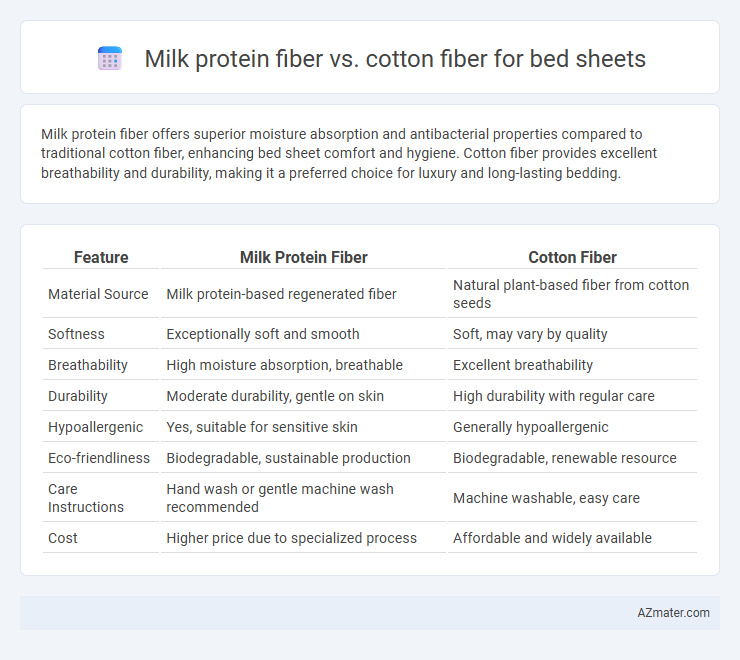Milk protein fiber offers superior moisture absorption and antibacterial properties compared to traditional cotton fiber, enhancing bed sheet comfort and hygiene. Cotton fiber provides excellent breathability and durability, making it a preferred choice for luxury and long-lasting bedding.
Table of Comparison
| Feature | Milk Protein Fiber | Cotton Fiber |
|---|---|---|
| Material Source | Milk protein-based regenerated fiber | Natural plant-based fiber from cotton seeds |
| Softness | Exceptionally soft and smooth | Soft, may vary by quality |
| Breathability | High moisture absorption, breathable | Excellent breathability |
| Durability | Moderate durability, gentle on skin | High durability with regular care |
| Hypoallergenic | Yes, suitable for sensitive skin | Generally hypoallergenic |
| Eco-friendliness | Biodegradable, sustainable production | Biodegradable, renewable resource |
| Care Instructions | Hand wash or gentle machine wash recommended | Machine washable, easy care |
| Cost | Higher price due to specialized process | Affordable and widely available |
Introduction to Bed Sheet Fabrics
Milk protein fiber bed sheets offer superior moisture absorption and antibacterial properties compared to traditional cotton fiber, enhancing comfort and hygiene. Cotton fiber bed sheets remain popular for their natural breathability, durability, and softness, making them a reliable choice for everyday use. Innovations in milk protein fiber technology combine the benefits of silk-like texture with eco-friendly production, presenting an alternative for sensitive skin and allergy sufferers.
What is Milk Protein Fiber?
Milk protein fiber, also known as casein fiber, is a type of regenerated protein fiber made from the milk protein casein, derived from leftover milk wastes. It offers exceptional softness, moisture absorption, and antibacterial properties, making it a comfortable and hygienic choice for bed sheets. Compared to cotton fiber, milk protein fiber is more eco-friendly, biodegradable, and provides better skin care benefits due to its natural amino acid composition.
What is Cotton Fiber?
Cotton fiber is a natural, cellulose-based fiber derived from the seed hairs of the cotton plant, widely valued for its breathability, softness, and durability in bed sheets. Compared to milk protein fiber, cotton offers superior moisture absorption and air circulation, enhancing comfort and cooling during sleep. Its hypoallergenic properties and resistance to static electricity make cotton bed sheets a popular choice for sensitive skin and allergy sufferers.
Softness and Comfort Comparison
Milk protein fiber bed sheets offer superior softness and moisture-wicking properties compared to cotton fiber, enhancing overall comfort and breathability. Cotton fiber sheets provide durability and good air circulation but may lack the silk-like smoothness and hypoallergenic qualities found in milk protein fibers. For those prioritizing a luxurious, gentle touch and temperature regulation, milk protein fiber bed sheets deliver an elevated sleep experience.
Breathability and Temperature Regulation
Milk protein fiber offers superior breathability compared to cotton fiber due to its porous structure, which facilitates better air circulation and moisture absorption. Its natural temperature regulation properties help maintain a comfortable sleeping environment by wicking away sweat and preventing overheating. Cotton fiber, while breathable, tends to retain more heat and moisture, making milk protein fiber a more effective option for temperature control in bed sheets.
Durability and Longevity
Milk protein fiber offers superior durability due to its strong molecular structure, making bed sheets resistant to wear and tear over extended use. Cotton fiber, while breathable and soft, tends to degrade faster through repeated washing and friction, reducing its longevity. Comparing the two, milk protein fiber bed sheets maintain their texture and strength significantly longer than traditional cotton variants.
Hypoallergenic and Skin-Friendliness
Milk protein fiber is naturally hypoallergenic and gentle on sensitive skin due to its amino acid composition that mimics human skin proteins, reducing irritation and moisture retention. Cotton fiber, while breathable and soft, can sometimes harbor allergens like dust mites and is less effective in moisture management compared to milk protein fiber. For individuals with sensitive or allergy-prone skin, milk protein fiber bed sheets offer superior skin-friendliness and reduced allergenic risk.
Environmental Impact and Sustainability
Milk protein fiber, derived from casein in milk, offers a biodegradable and eco-friendly alternative to cotton fiber, which requires extensive water and pesticides in its cultivation. The production of milk protein fiber generates lower greenhouse gas emissions and reduces resource consumption compared to conventional cotton farming. Choosing milk protein fiber bed sheets supports sustainability by promoting renewable materials and minimizing environmental degradation.
Maintenance and Care Requirements
Milk protein fiber bed sheets require gentle washing with mild detergents and prefer air drying to maintain fabric integrity and softness, while cotton fiber sheets are more durable and can withstand higher temperature washes and frequent machine drying without significant wear. Milk protein fiber is naturally antibacterial and resists odors, reducing the need for frequent laundering compared to cotton, which may retain sweat and allergens longer. Proper care of milk protein fiber sheets involves avoiding bleach and fabric softeners to preserve fibers, whereas cotton sheets are typically more resilient to standard maintenance products and practices.
Which Bed Sheet Fiber is Best for You?
Milk protein fiber offers excellent moisture absorption and antibacterial properties, making it ideal for sensitive skin and allergy sufferers. Cotton fiber is highly breathable, durable, and widely available, providing classic comfort and ease of care. Choosing the best bed sheet fiber depends on your priorities: milk protein fiber for enhanced skin benefits and softness or cotton fiber for natural breathability and long-lasting performance.

Infographic: Milk protein fiber vs Cotton fiber for Bed sheet
 azmater.com
azmater.com